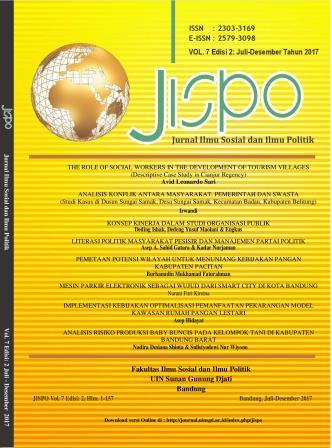PENGAWASAN DAN AKUNTABILITAS APARATUR DALAM PERSPEKTIF ETIKA BIROKRASI: STUDI KASUS PADA PEMERINTAH DAERAH KABUPATEN CIANJUR
DOI:
https://doi.org/10.15575/jispo.v7i2.5707Keywords:
Oversight, Accountability, Regional Government, Ethical Perspective.Abstract
This article aims to find out the problems of supervision and accountability, as well as the strategy of the Cianjur Regency Government in carrying out supervision and accountability in ethical perspectives. This research was conducted using descriptive methods with a qualitative approach. The ethical perspective on supervision and public accountability within the Cianjur Regency Government is actually an "oasis" in the midst of weakening public confidence in the government apparatus. Through effective supervision, the Cianjur Regency Government will be able to anticipate and overcome various deviations that have so far remained a concern of the community. Whereas through good and right public accountability a professional, transparent, accountable, credible and corruption-free, collusion and nepotism administration can be obtained.
References
Atmasasmita, R. (2000). Kebijakan Hukum Dalam Pemberantasan Korupsi Kolusi Nepotisme di Indonesia. Bandung: Makalah lokakarya.
Gaebler, T., and Plastrik, P. (1997). Banishing Bureaucracy: The Five strategies For Reinventing Government. Massachusetts: Addison Wesley.
Hakim, M. A. (2000). Korupsi dan Upaya Pemberantasannya: Beberapa Catatan Yuridis-Politis. Bandung: Makalah Lokakarya.
Holbrook, T. M., dan Meier, K. J. (1993). Politics, Bureaucracy dan Political Corruption: A Comparative State Analysis. New York: M.E. Sharpe.
Lapsey, F. M. (1996). Accounting and Performance Measurement. London: Paul Chpman Publishing Ltd.
Makmur, M. 2003. Dasar-Dasar Administrasi Publik dan Manajemen Publik. Malang: FIA UB.
Miles, M. B., Huberman, A. M., & Saldaña, J. (2014). Qualitative data analysis: A methods sourcebook. 3rd.
Nugroho, R. (2001). Reinventing Indonesia: Menata Ulang Manajemen Pemerintahan Untuk Membangun Indonesia Baru Dengan Keunggulan Global. Jakarta: PT. Gramedia.
Obsorn, D., and Gabler T. (1992). Reiventing Government: How the Enterpreneurrial Spirit is Transforming the Public Sector. USA: Addison-Wesley Publishing Co. Inc. Massachusette.
Rasul, S., dkk. (2000). Pengukuran Kinerja: Suatu Tinjauan Pada Instansi Pemerintah. Jakarta: BPK.
Rasyid, R. (2000). Arah Kebijaksanaan Pemberdayaan Sumber Daya Aparatur Negara Yang Profesional Dalam Era Pembangunan Indonesia Baru, Makalah.
Sindung, O. (2005). Perumusan Indikator Kinerja dan Pengukuran Kinerja Pemerintah Daerah. Diskusi Panel yang diselenggarakan oleh FE UAD dan BPK Perwakilan Yogyakarta, 24 Agustus 2005.
Sugiyono. (2010). Metode Penelitian Kuantitatif, Kualitatif, dan R&D. Bandung: Alfabeta.
Thoha, M. (1999). Administrasi Negara Demokrasi, dan Masyarakat Madani. Jakarta: Lembaga: Administrasi Negara.
UNDP. (1996). Proces Consultation: Systemic Improvement of Public Sector Management, Presented in the International Conference on Governance Innovation: Building the government-Citizen-Business Partnership; October 20-23, Manila, Philipina.
Downloads
Published
How to Cite
Issue
Section
License
Authors who publish their manuscripts in JISPO agree to the following terms:
- Authors retain copyright and grant the journal right of first publication with the work simultaneously licensed under a Creative Commons Attribution-ShareAlike 4.0 International License that allows others to share the work with an acknowledgment of the work's authorship and initial publication in this journal;
- Authors are able to enter into separate, additional contractual arrangements for the non-exclusive distribution of the journal's published version of the work (e.g., post it to an institutional repository or publish it in a book), with an acknowledgment of its initial publication in this journal; and
- Authors are permitted and encouraged to post their work online (e.g., in institutional repositories or on their websites) after publication process, or prior to and during the submission process, as it can lead to productive exchanges, as well as earlier and greater citation of published work (See The Effect of Open Access).


